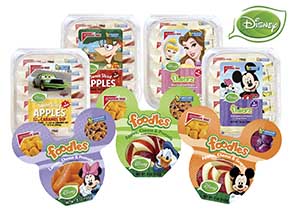
A partnership with Disney resulted in 18 percent of Crunch Pak’s business being in Disney-labeled products. (Courtesy Crunch Pak.)
At first glance, apples, like eggs, seem endowed by nature with perfect packaging, but the market for fresh apple slices continues to grow.
“People thought we were crazy—people still think it’s crazy that people buy an apple that’s already sliced,” admits Tony Freytag, senior vice president for sales and marketing at Crunch Pak. And those people include the general manager of a major retail store who buys $10 million in sliced apples each year and still doesn’t understand why people buy them.
Crunch Pak sells 2 million apple slices a day in 14-ounce family packs, in trays, in clamshells, in single-serving plastic bags, and in larger value packs. When home use, institutional use, and fast-food restaurant use are all combined, apple slicing is a $475-million business nationally.
“Crunch Pak was founded by apple growers who believed that people would eat more apples if they were easier to eat,” Freytag said. “Kids with small mouths, missing teeth, or with braces can eat slices when they can’t bite a whole apple.”
In a school lunch study, fruit sales increased 61 percent when the fruit was sliced.
Young adults prefer prepared foods for snacks. And they’re looking for healthy snacks. When buying sliced apples, they look for freshness, nutrition, healthfulness, and convenience, in that order, and pricing at $1.99 or less, Freytag said.
Fast-food restaurants, striving to improve their image and meet Dietary Guidelines for Americans, are offering sliced fruit.
One child in three is obese. Eighty-eight percent don’t eat three or more servings of fruit or vegetables a day.
Freytag said that 69 percent of women aged 18 to 60 don’t buy sliced apples, so there’s room for growth.
Technically, sliced apples can’t be labeled “fresh” since they are bathed in calcium sorbate, a preservative they keeps them from decaying, discoloring, or losing crispness, Freytag said. Packaged, sliced, bagged apples, properly refrigerated, have a 21-day shelf life, he added.
Freytag spoke to apple growers and marketers during the U.S. Apple Association’s Apple Crop Outlook and Marketing Conference in Chicago in August last year.

Leave A Comment